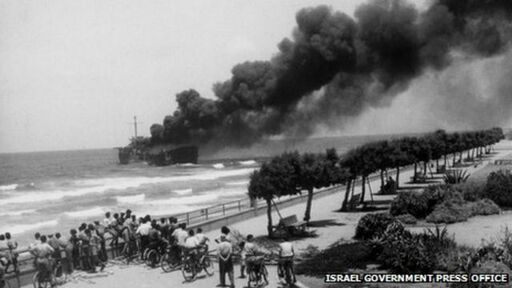On civil war – Pfeffer in Haaretz:
‘There are two ways to say “civil war” in Hebrew. The more accurate and technical translation of the term is milchemet ezrachim – a war of civilians or citizens. The other term, a more literal one, is milchemet achim – a war of brothers. That’s the one Israeli leaders have used in the past to warn of a possible civil war.
Menachem Begin famously said twice “there will not be a war of brothers”: once in November 1944, when the Haganah (pre-independence Jewish army) turned members of his Irgun underground militia over to the British Mandate police. And then again in June 1948, when the Irgun’s Altalena ship – which was carrying weapons and volunteers from Europe – was fired upon and destroyed by the Israel Defense Forces off the coast of Tel Aviv. This was due to David Ben-Gurion’s suspicion that they were part of an Irgun plan to carry out a military coup.’
(…)
‘“When I heard Gantz’s warning this week, I remembered the last time I heard similar talk in Israel. It was in the months leading up to the disengagement from the Gaza Strip and the settlements of northern Samaria in the summer of 2005.
It just won’t happen, the nation won’t let it happen,” was what you heard wherever you went in the settlements and during the anti-government protests at the time. Most left it at that: an amorphous promise that Ariel Sharon’s plan, supported by a majority of Israelis, would somehow be defeated.
There was those who went into more detail: dark mutterings of atrocities against Palestinians that would cause another intifada; a mass revolt in the IDF; sabotage of infrastructure that would see the country grind to a halt.
Some of that did happen. There were a couple of vigilante murders of Palestinians in the West Bank, a few dozen soldiers did refuse to carry out orders and some roads within Israel were blocked. One then-unknown activist, who is today Israel’s finance minister, was arrested on suspicion of planning arson attacks, but he was never indicted.’
(…)
‘The IDF’s tradition of obeying orders from the elected politicians is still strong and, anyway, both conceivable sides in a civil war are well represented throughout its ranks so it is hard to imagine the army taking sides.
Who else is there? The police are a disorganized rabble at the best of times, and the number of truly ideologically motivated settlers willing to risk something like that are small. They can bully their Palestinian neighbors, but a full-blown revolt is beyond them.
The pro-democracy forces in Israeli society will go on protest marches, but don’t have the stomach for anything more than some gentle tussling with the police. They have too much to lose.
The violent protests of the ultra-Orthodox community, like we saw during the COVID pandemic, are always rather amateurish and mainly symbolic.
Israeli Arabs certainly won’t go to war for a democracy that treats them at best as second-class citizens. Even in the rare cases where they have rioted in solidarity with their Palestinian siblings in the West Bank and Jerusalem, as happened in October 2000 and May 2021, these were always short-lived and limited outbursts of violence. They also have too much to lose.
And that’s the bottom line. For all Israel’s problems, life here is still too good, for all of Israeli communities, to risk a civil war. Losing what is left of Israel’s fragile and limited democracy will be a terrible blow for many, perhaps even most, Israelis – but it won’t be worth going to actual war for.
The overwhelming majority of Israelis will feel that they still stand to lose more than just their democracy. Especially since there’s no way of winning such a war.’
Read the article here.
No civil war because our lives are fairly comfortable, too comfortable at least for widespread violence, is of course the main reason for the absence of such a war, not only in Israel.
The flip side of that coin: democracy might die because we just have too much to lose.
